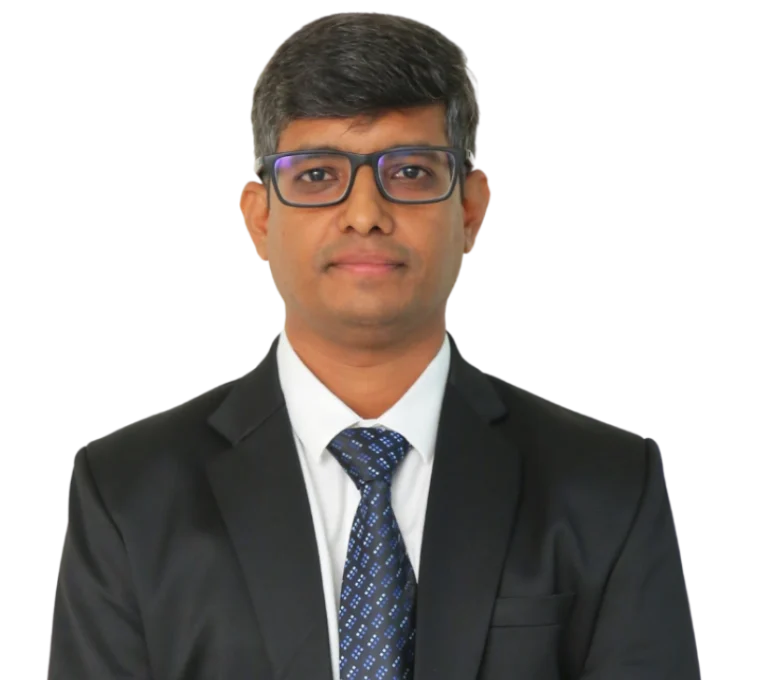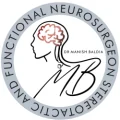Ever watched your hands shake and thought, “I just want to feel normal again”?
That’s exactly how most people living with Parkinson’s or tremor disorders feel every single day. The stiffness, the slowing down, the frustration — it’s exhausting. Over one million people in India battle Parkinson’s disease and similar movement disorders every year. While medications may work at first, many patients reach a stage where they no longer bring relief. That’s when Deep Brain Stimulation (DBS) can truly change lives.
Deep Brain Stimulation (DBS) has been changing lives across India — helping patients walk, write, and smile again. Leading this transformation is Dr Manish Baldia, a top DBS Specialist in Pune, trusted for his precision, compassion, and life-restoring results in advanced neurosurgery.
“My Goal Is Simple — To Give My Patients Their Life Back”
Dr Manish Baldia is a surgeon who has made it his life’s purpose to restore freedom to people living with movement disorders.
Armed with qualifications like MBBS, MCh (CMC Vellore) and EEPIN (London), and mentorship under the legendary Dr. Paresh Doshi, Dr. Baldia brings international training and unmatched precision to every procedure.
With over 120 successful DBS surgeries and 1,000+ advanced programming sessions, his experience is among the most extensive in India. But it’s his calm confidence, empathy, and genuine involvement that make him one of the most respected Deep Brain Stimulation (DBS) Surgeon specialists in the country.

Expertise & skills in Neurosurgery
Celebrating Prizes & Awards in Neurosurgery
Academic Publications in Neurosurgery
Public Camps for Neurosurgical Education and Outreach




Here’s the simple version:
Deep Brain Stimulation (DBS) is like installing a smart pacemaker for your brain. Tiny electrodes are placed in specific regions of the brain and connected to a small device that sends electrical signals — gently correcting the irregular messages that cause tremors and stiffness.
The best part? It’s adjustable, reversible, and gives long-term symptom control. For many people, DBS feels like getting their life back — steady hands, smoother walking, better sleep, and freedom from high medication doses.
As a leading DBS Specialist in Pune, Dr. Baldia helps patients with:
Parkinson’s disease: Regaining movement, balance, and independence.
Dystonia: Reducing painful muscle contractions and abnormal postures.
Essential tremor: Controlling shaking so daily tasks become easy again.
Tourette’s syndrome & OCD: Offering relief in complex cases.
Failed DBS cases: Using advanced imaging and white matter tractography to revise or reprogram older systems with precision.
Every treatment plan is personalized — because every patient’s journey is unique.
When patients meet Dr Baldia, the first thing they notice isn’t just his expertise — it’s his calm reassurance.
Here’s what sets him apart:
Wondering what happens during DBS treatment? Here’s how Dr. Baldia simplifies it for his patients:
Within a few weeks, most patients experience better movement, less tremor, and improved daily functioning.
Spinal Cord Tumor Surgery
58-yr-old man breathes again after rare surgery following spinal cord injury
Mr. Ramesh S. (62, Parkinson’s)
“My tremors were so bad I couldn’t hold a pen. After DBS surgery by Dr. Baldia, I can write and eat again. It feels like magic.”
Mrs. Kavita M. (48, Dystonia)
“He explained every detail so clearly. My neck spasms are gone. I feel confident stepping out again.”
Mr. Yusuf A. (55, Essential Tremor)
“I can drink tea with steady hands now! His patience and positivity kept me going.”
Mrs. Nalini P. (67, Parkinson’s)
“After years of depending on my family, I’m walking and cooking again. He gave me my dignity back.”
Mr. Arun V. (58, Revision DBS)
“Another hospital told me nothing could be done. Dr. Baldia reprogrammed my old DBS and I’m symptom-free now.”
These stories aren’t rare — they’re becoming routine in Dr. Baldia’s practice.
🏅 Young Neurosurgeon Award – 2018
🏅 Best Researcher – CMC Vellore (2017 & 2018)
🏅 Best Paper & Poster – Stereocon 2022
🏅 Best Paper – YNFCON 2024
Beyond awards, his greatest achievement lies in the hundreds of grateful smiles he’s restored.
Deep Brain Stimulation (DBS) surgery involves implantation of an electrode deep within the brain under local anaesthesia. Electrode is permanently left in place in brain and connected to a small pacemaker (IPG) This IPG is implanted in the chest. No leads or implants are seen outside the body. The IPG is programmed with the help of a remote and it controls motor symptoms.
DBS will improve patients “ON” (good) period duration that is the time when the patients are fully functional without any side effects of medicine. This surgery will be able to increase the good period to last around 70-80% of the day. After successful DBS we can reduce the medications by 30-40%. Surgery also offers benefit on various motor fluctuations, hallucinations, dyskinesias, reducing depression, increasing weight and generating positive feeling in patients there by improving the quality of life.
However not all the patients benefit equally, and hence it is very important that your surgeon understand what he can deliver by surgery and what he can improve by medical management so that you can understand the exact outcome of surgery. Most centres do not have adequate experience to give you convincing and confident answers to all these questions.
DBS surgery is safe in experienced hands. The risks of surgery are minimal. We have analysed and found that our risk of major complication was less than 2%. This compared favourably with the best centres in the world. As a patient you need to evaluate risk vs benefit ratio. The risk of procedure reduces with learning, for example experienced and trained driver of a car is less likely to make mistakes than a new driver.
In the initial years Parkinson’s Disease is controlled by medications. With the progression of disease, side effects of the disease increase in the form of motor fluctuations, dyskinesias and hallucinations. By this time increasing the dose of medications will cause more side effects than benefits. Usually this period comes around four to six years of disease initiation. So, we believe that surgery should be offered to the patients when it is not adequately controlled by medical management, increasing the side effect of medication effecting the quality of life.
Deep Brain Stimulation (DBS) involves mainly two steps, the first one being the implantation of an electrode deep within the brain under local anaesthesia and the second one is implantation of IPG in the chest. We have perfected the art of surgery and have realized that each patient is an individual and we must cater to the mindset of every patient. During the first two days there are extensive Parkinson’s Disease related assessments, video recordings and patient counselling by our team to ensure that the patient can undergo surgery with confidence and smile. A typical surgical procedure involves admission on Day 1, followed by MRI under sedation or general anaesthesia on Day 2, surgery for electrode implantation under local anaesthesia on Day 3 and pacemaker implantation under general anaesthesia on Day 4. A typical DBS operation theatre set up is shown in the picture below. We do stimulation trial on OT table and confirm the results with patient that is why we keep the patient awake during the surgery. Usually patient stays in hospital for 8 to 10 days till the suture removal and programming is completed.
Initially there is minimal pin prick when we give you local anaesthesia, however once the local anaesthesia takes effect you will not feel any pain during the surgery, however you will realize that we are working on your head and we will be keeping you informed of all the things during the procedure as we go along. This increases the patient comfort and confidence in the procedure and none of our patient have ever felt that he had a traumatic experience from the surgery. You will not be sedated during the procedure.
Yes, elderly patients do worry about the risks and fitness for the surgery, but it depends upon the surgical procedure which you are undergoing. DBS is a safe and simple surgical procedure and along with it the surgeon’s experience of handling an elderly patient matters a lot. We do understand that elderly patients are associated with multiple co-morbidities but at our centre we are specialized in handling all such elderly patients. If the patient cannot tolerate surgery under local anaesthesia we can do it with conscious sedation. We also prepare ourselves, patients and relatives to ensure that the surgical experience remains as comfortable and safe as one would wish to be. We published our outcome of elderly patients versus young patients operated at our centre and found that there was no increase in rate of complication and the improvement in Parkinson’s disease was similar.
After surgery we will provide you with the detailed list of dos’ and don’ts to safeguard the pacemaker. Broadly speaking, you can continue to do all the normal activities that you would like to do, e.g. swimming, dancing, jogging or any kind of exercise, use of cell phone, microwave oven, driving etc.
I have a track record of programming most patients by the time of discharge. They also have minimal follow up visit requirement. More than 50% of patients do not need any follow up till 2 years. If required most of the programming can be done on out-patient basis.
Programming is the key to success for DBS surgery. To get the full benefit of surgery, correct knowledge of programming the pacemaker is very crucial. If you cannot program it correctly you will not get the desired benefits of the surgery. My team has more than 2000 hours of programming experience and hence we can immediately assess the response of each program subset and offer what is best for you.
There are two major companies in India which provide DBS implants.
The 4 key points to be checked while choosing the implant is
The best suitable implant varies from patient to patient due to many factors. Hence, the best person to recommend is your surgeon. Take appropriate suggestions from him before making the selection.
Life with tremors or stiffness doesn’t have to be limiting. With the expertise of Dr Manish Baldia, an internationally trained DBS Specialist in Pune, you can move again with confidence and live without fear of losing control.
If you or your loved one is struggling with a movement disorder, take the first step today.
📍 Consult at:
– Ruby Hall Hospital
🕘 Time: 9:00 AM – 9:00 PM
📞 Call: 96767 67507
Because with the right care, every movement tells a story of strength — and yours starts here.

Dr. Manish Baldia – Expert Neurosurgeon | Specialized in DBS, Spine Surgery & Stereotactic Procedures.